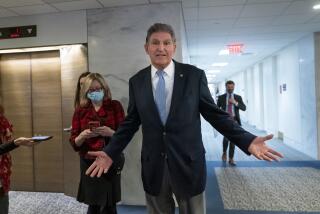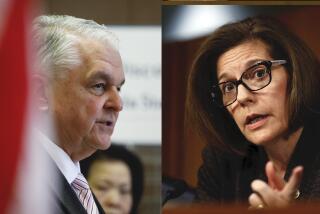Soviet Communists May Split Into 2 or 3 Parties : Politics: Radical reformers woo liberals. Hard-liners push for a new congress to depose Gorbachev.
- Share via
MOSCOW — Deep fissures are opening within the ruling Soviet Communist Party with the potential for dramatically altering the country’s political landscape by its division into two or three separate parties.
Radical reformers, among them the early leaders of perestroika, are debating the formation of a new social democratic party, which they hope would win the support of most of the Communist Party’s liberals.
Hard-line Communists, seeking to overturn President Mikhail S. Gorbachev’s latest reforms, are pushing for a new party congress in the autumn to depose him as the party’s general secretary and force a return to orthodox Marxism.
Although soundly defeated in last month’s Russian Federation presidential election and then in a parliamentary confrontation with Gorbachev, the conservatives will open party disciplinary hearings today on the loyalty of former Foreign Minister Eduard A. Shevardnadze and Alexander N. Yakovlev, Gorbachev’s senior adviser, who have talked about formation of a new party.
Pressure is meanwhile mounting on Gorbachev among his supporters in the party center and within his own Kremlin staff for a final showdown with the conservatives at a meeting of the Communist Party’s policy-making Central Committee later this month in a move to drive them out of the party.
Gorbachev is also being pressed--after last month’s Cabinet rebellion led by Prime Minister Valentin S. Pavlov and backed by the military and security forces--to form a coalition government that would give non-Communists their first real share of power and reflect the new political balance here.
Whether among radicals or conservatives or in the party center, the conviction is growing that the Communist Party must quickly redefine itself--that it must decide on its basic political philosophy, its role as a party in a pluralist society, its organizational character.
But the result of such a move is likely to be a full-scale split of the party, which once boasted of being a political monolith and whose predominance here was an element that for more than 70 years defined Soviet socialism.
With party members still holding the vast majority of positions in both the executive and legislative branches at all levels of Soviet government, except in those republics that are moving toward independence, such splits would carry the political skirmishing to the whole country and down into every city and village council.
“Unfortunately, it is not just the democratic wing but what is often called the neo-Bolshevik wing that has stepped up its action in the party,” said Col. Alexander Rutskoi, leader of Communists for Democracy, who was elected last month as Russian Federation leader Boris N. Yeltsin’s vice president.
“Society is being democratized faster than the party,” Rutskoi commented last week, “and as a result the gap is widening between the leaders of the party and its rank and file, between the apparat and party cells.”
Liberals contend that the Communist Party must be broken up, that it has failed to accept the reforms that it began. They propose to start a new social democratic party, perhaps led by Shevardnadze, Yakovlev and others, that would support Gorbachev from the left.
“The time has come to create a constructive opposition of the democratic trend,” Shevardnadze said in an interview with the independent Soviet news agency Interfax on Friday. “This will not be a confrontational organization--the people are tired of strife, slogans and demagogy.
“We should build a real force standing for deeper reforms. Its interest will focus first on the individual and only then on other issues. We are willing to support all that is sensible and right, and we should have a firm foundation to resist irrational and harmful decisions, no matter what corridors of powers they come from.”
Although the discussions are said to be well-advanced, leaders of the movement have failed to reach agreement on its program or on these strategic questions: Should it try to split the Communist Party and become a separate party? Should it attempt to unite other still-tiny parties and the Democratic Russia movement? Should it should remain a broad alliance drawing support from within and outside the Communist Party?
One proposal calls for liberal members of the Communist Party’s policy-making Central Committee to break with the party and walk out of a meeting planned for late July if Gorbachev fails to force the conservatives to quit then. The liberals would then form the nucleus of the new party, and the dramatic walkout would be its launching.
Shevardnadze, who remains a member of the Central Committee, warned that only a nationwide opposition movement--a true, multi-party political system, in other words--could “overcome the crisis in the country, save democracy and prevent all attempts to relapse to the old order and to a totalitarian regime.”
A united front is essential, he argued, to combat conservatives who have launched “a war against the policy of perestroika and renewal, against the new thinking (the new Soviet foreign policy) and its supporters.”
Stanislav S. Shatalin, a former economics adviser to Gorbachev, predicted without hesitation last week that there would not only be a new party, rivaling the Communists but also that it would bring a virtual exodus of leading political figures, including Shevardnadze and Yakovlev, away from the Communists into the new party.
“There are some things that I am not at liberty to disclose,” Shatalin told the National Press Club in Washington, “but in July there will be some very important political things happening in our country, leading toward a positive solution of our problems.”
The radicals have attempted to portray the new party as a source of support for Gorbachev from the left, a counterbalance to the conservatives, that would enable him to proceed with perestroika, as his program of political and economic reforms is popularly known.
But Georgy Shaknazarov, a key Gorbachev adviser, suggested last week that the president might prefer to continue rebuilding the Communist Party, forcing out the conservatives, to maintain it as his primary political vehicle.
While acknowledging the need for “a stable multi-party system with two major parties and possibly a third, centrist one to regulate relations between the major parties,” Shaknazarov contended that the Communist Party “should radically rebuild itself and become a socialist-type party able to uphold its views in Parliament and win elections.”
In reply, Moscow Mayor Gavriil Popov, who won an overwhelming mandate in last month’s elections on a platform of radical reform, told a weekend congress of the Russian Republican Party that only formation of a new, nationwide party would break the Communists’ hold on power and promote the country’s political and economic transformation.
Popov, who quit the Communist Party last summer and is working now to organize the new social democratic party, said he feels that “every honest person” should now quit the Communists and join their rival, which he proposed be called the United Democratic Party.
Arkady N. Murashev, a leader of Democratic Russia, who has also been active in efforts to organize the new party, said, “All of us are interested in splitting the Communist Party.” He argued that this was a precondition to development of democracy here. He predicted that as many as half of the Communist Party’s 16.3 million members might follow such top leaders as Yakovlev and Shevardnadze to a new party.
Yakovlev, a member of the party’s Politburo until last summer and still Gorbachev’s senior adviser, said in a weekend statement that he is still a Communist Party member. But he made clear that he might well break with it after 47 years of membership.
In a warning to the conservatives, he added, “I shall act as my conscience will tell me.”
Yakovlev and Shevardnadze are the primary targets of an ideological inquisition, which begins today, by the party’s Central Control Commission, which decided to investigate whether their statements and activities violated party rules and policies. The commission could reprimand or expel them if it judged them guilty.
Gorbachev himself is under open attack by conservatives, who are trying to force the party leadership to convene a special congress that would consider his replacement as general secretary as well as adopt a new party program.
The hard-line Movement for a Communist Initiative declared at a weekend conference here that the Communist Party under Gorbachev’s leadership “had abandoned its social base and now upholds the interests of small-scale property owners and the bourgeoisie who are already filling their pockets.”
The Marxist Platform, an orthodox faction within the party, said in a similar statement that Gorbachev’s adherence to the “socialist choice” was now “in clear contradiction to legislation being adopted with the aim of the destruction of public property” and the introduction of private enterprise.
Communist Party leaders from 11 regions across Siberia have signed an appeal to Gorbachev calling on him to resign and the party to elect a new leadership at an emergency congress.
More to Read
Sign up for Essential California
The most important California stories and recommendations in your inbox every morning.
You may occasionally receive promotional content from the Los Angeles Times.










